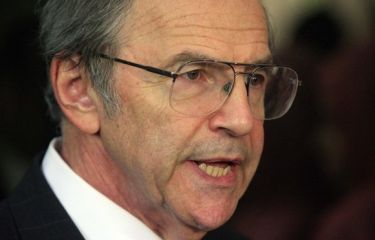Cooperation Agreement lays out path for durable peace between Sudan & S. Sudan- Lyman
December 11, 2012 (NEW YORK) — US special envoy to Sudan and South Sudan reaffirmed the support of his country to the Cooperation Agreement saying it represent the best option to establish solid relations between the two countries.

Speaking in a debate on the relations between the two Sudans at Columbia University’s Institute for the Study of Human Rights on Monday evening, Lyman expressed his concern over the delay in the implementation of the Cooperation Agreement signed in the Ethiopian capital, Addis Ababa on 27 September.
He stressed the need for the two sides to overcome their suspicions and to go ahead with implementation of this major agreement, which open the way to a lasting peace and allow to improve the lives of both the Sudanese and the South Sudanese people, he said.
He also pointed out that a cession of hostilities deal between the Sudanese army and the SPLM-N fighters would create a conducive environment to implement the security arrangements.
Khartoum and Juba failed to agree on the implementation of the security deal as the former continues to demand the latter to disarm the South Kordofan and Blue Nile rebels who were part of the SPLA before the independence.
The State Department Tuesday announced Lyman’s departure to Juba for talks over Abyei and the implementation of stalled security arrangements. He will also attend a meeting the African mediation organises in Addis Ababa for the joint political and security committee on 15 December.
Lyman was in Khartoum last November for talks with the Sudanese officials over the implementations of the security agreement and the bilateral relations between the two countries.
The discussion was chaired by David L. Phillips, director of the Program on Peacebuilding and Rights at Columbia University’s Institute for the Study of Human Rights. While, Ahmed Hussein Adam, a visiting scholar in charge of the two Sudans project and co-chair of Sudans forum commented Lyman’s intervention.
Speaking about the political developments in Sudan, the American official reiterated that Washington support peaceful change emphasising that Sudan does not need more war. He said in favour of a comprehensive process where the relation between the centre and periphery has to be redefined.
Lyman also stressed that the United Sates supports justice in Darfur and would not back any move to defer the prosecution of President Omer Al-Bashir. The article 16 of the International Criminal Court statute gives the UN Security Council the power to defer ICC prosecutions and investigations in the interests of peace and security .
He further said that the war crimes and crimes against the humanity committed in Darfur led his country to impose economic sanctions on Sudan, underscoring that many of it are voted by the Congress and enacted into law.
On the humanitarian situation in the Two Areas, Lyman described the humanitarian situation in the Nuba Mountains as “tragic” saying the U.S. Administration will keep to support the ongoing efforts to seal a deal to allow humanitarian access to the areas controlled by the SPLM-N.
In a speech over the relations between Sudan and the United States last August, Lyman proposed a roadmap to normalise bilateral ties including the humanitarian access to the Nuba Mountains settlement of the conflict in the Two Areas , Darfur and to resolve the outstanding with the South Sudan.
In his commentary on Lyman’s speech, Ahmed Hussein Adam praised the efforts exerted by the American diplomat during his mandate to bring peace in and between the Sudans and to settle the different conflicts there, stressing that Sudan is at crossroads.
Pointing to the situation in Blue Nile, Darfur and South Kordofan, Adam regretted that the Sudan is at war with itself.
He pointed out at the responsibility of the international community to protect civilians saying the world has to provide humanitarian assistance to the affected population in the conflict areas. He also accused Khartoum of using food as “a weapon in a war that it would not win”.
The visiting scholar spoke about the severe economic crisis and the power struggle between the different factions of the ruling National Congress Party.
He suggested that the solution of the current political stalemate in the country requires all “the forces of change” in the country should work together during an interim period on a national programme for a new era in Sudan.
The Centre will host another debate next month with Francis Deng, South Sudanese Permanent Representative to the United Nations.
(ST)
